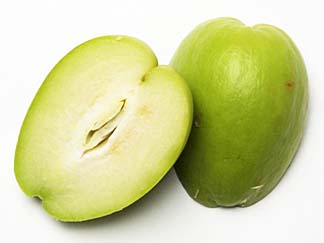

Key Ingredient

Although the summer squash season is winding down, another squash variety similar to summer squash is still going strong. Chayote, though not as widely available here in the islands, is a favorite in South American, Caribbean, Puerto Rican and Mexican cuisines. Chayote
The basics: Chayote, also known as vegetable pear or mirliton (in Louisiana) is a pear-shaped, gourd-like fruit that is part of the squash and cucumber family. It is native to Central America and was once the principal food of the Aztecs and Mayas.
Used primarily as a vegetable, chayote is similar in size to an avocado, with a slightly bumpy, light green skin. The flesh is creamy white in color with a center pit. Both the vine shoots and the root of the chayote can be enjoyed.
Chayote has been compared in taste to cucumber or zucchini, with an overall bland flavor. The squash is a good source of potassium.
Selecting: Look for squash that are firm and darker green in color. Watch out for soft spots and bruising. The skin of smaller-sized squash tends to be less tough and may not need peeling.
Storing: Chayote can be stored in a plastic bag in the refrigerator for up to a week.
Use: If the skin is tough, peel it off with a vegetable peeler or paring knife, working under running water to rinse off the sticky sap. If stuffing, leave skin on.
Chayote can be used in the same manner as other varieties of squash: in soups, stews, steamed or stuffed.
It can also be eaten raw in salads or pickled.
Recipes that use chayote tend to be highly flavored and spiced because of the squash's rather mild flavor.
A popular cajun dish calls for stuffing chayote with shrimp and crab and a number of spices to add zest.
Where to buy: Chayote is generally available year-round, but is more abundant in the fall and winter months at peak harvesting time. Most supermarkets locally will carry chayote on occasion, although you might need to hunt a bit. Prices range from $2.69 to $3.99 a pound.
Food Stuffs: Morsels
Contact Eleanor Nakama-Mitsunaga
online through features@starbulletin.com